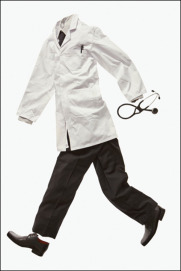An editorial in The Lancet Psychiatry discusses the potential harms that come with the use of the medicalized language of mental health. Medicalization, which can be “responsible for applying harmful labels to suffering individuals in the form of diagnoses and pseudo-technical descriptions,” has crept into social and political explanations of violence and terrorism. But another form of medicalization, what the editor’s dub “non-medical medicalization,” has grown up alongside this tendency, providing clinical weight to non-clinical social phenomena.
© 2024 Mad in America Foundation
















The final sentence says:
“Perhaps the most that psychiatrists can manage is to realise that while they might not wield scalpels, handle sources of radiation, or have access to cytotoxic drugs, they employ language and concepts that are potentially hazardous in their misuse.”
I point out that they just as potentially hazardous in their “use” as their misuse…perhaps more so.
It is psychiatrists who have given rise to the “diagnoses” which have no basis in fact but instead are descriptors of clusters of usually quite normal reactions to varying situations, and now they are expressing concern that normal people are adopting them in everyday non-medical use and this could be hazardous.
Well, Mr/Ms psychiatrist, that is because they are non-medical terms. They are not based in science. There is very little diagnostic consistency or reliability between psychiatrists seeing the same “patient”, so the non-medical people using these terms have as much chance (perhaps more if they are self-diagnosing or diagnosing a person they know well) of getting the fake “diagnosis” right as a psychiatrist who lobs it onto a “patient” after a 15 minute consultation.
It can be hoped that these “diagnoses” become so commonly used (read abused) that they become even more meaningless than they currently are, and that people giggle at the thought of “real” doctors actually charging people for the application of such tags.
Why pay when one can get such a “diagnosis” free from a friend or via a quick quiz on some social media site with just as much chance of accuracy and less chance stigma and serious professional fallout and/or of being prescribed dangerous, destructive and highly addictive drugs ?
On social media you might even be able to link to a site where you can buy the t-shirt!
Just saying….
Report comment
Cytotoxic means “toxic to living cells,” and the psychiatric drugs are shortening life spans by over a decade, so where is the proof “psychiatrists … might not … have access to cytotoxic drugs”? I think the poor outcomes do imply the psychiatric drugs are “toxic to living cells.”
But I do agree, proclaiming a person has a “lifelong incurable genetic mental illness,” when there is zero actual scientific proof any of the DSM disorders is a real disease entity, with genetic etiology, is disempowering and disingenuous. And the psychiatrists are gas lighting people who harbor legitimate social concerns, with the psych drugs to cover up their legitimate concerns, like that of child abuse. Gas lighting people is not actually mental health care, it’s mental abuse. And the current psychiatric system is a gas lighting industry, not a mental health industry.
Report comment